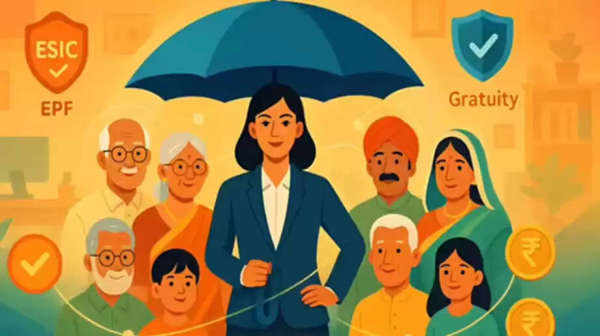
You may be aware that four new labor codes have been implemented in the country. These include the Wage Code, the Industrial Relations Code, the Social Security Code, and the Occupational Safety, Health, and Working Conditions Code. The Social Security Code (CCS Code), 2020, has undergone a major change. It has expanded the definition of family. This will benefit millions of working employees, especially women.
Changed Definition of Family
Under this new law, the definition of who will be included in 'family' for employee benefits has been expanded. This change could transform the way millions of families plan financially. It will improve insurance coverage, gratuity benefits, and eligibility for ESI.
Where will this definition apply?
This expanded definition will apply to several important government schemes for employees. These include the Employees' State Insurance Corporation (ESIC), the Employees' Provident Fund (EPF), gratuity, and compensation for workplace accidents. Anna Thomas, partner at Cyril Amarchand Mangaldas, told ET that this expanded definition applies to dependents of all eligible employees, whether they are permanent or fixed-term employees. However, these new rules only apply to the government schemes mentioned above.
Will not apply here
Speaking to ET, Noorul Hassan, executive partner at Lakshmikumaran & Sridharan Attorneys, explains, "This will not automatically apply to employer-run benefits such as group health insurance, mediclaim, medical reimbursement, or wellness programs, as these are mostly voluntary."
Financial responsibility extends further.
This recent change reflects how Indian labor laws now view family. It recognizes that financial and caregiving responsibilities in Indian families extend far beyond just a small family. Under the old system, only certain relatives could be included in an employee's family benefits. These were typically:
• Spouse (husband/wife)
• Children
• Parents
• Unmarried daughters
Hassan says, "Traditionally, labor laws limited family members to a specific group: father, mother, son, unmarried daughter, and wife. Courts have often invalidated even close relatives outside this specific group. This completely defeated the purpose of enrollment."
Who is now included in the family?
The Social Security Code, 2020, which aims to consolidate nine central labor laws into a comprehensive framework, has significantly expanded this definition. The new definition now includes the maternal grandparents of all employees. Furthermore, any minor, unmarried brother or sister of the employee who is completely dependent on the employee will also be included. A special provision has been made for women employees. Now their parents-in-law are also included as dependents.
Female employees benefit
Pratik Vaidya, MD, and Chief Vision Officer of Karma Management Global Consulting Solutions, says that previously, women could only include their parents as dependents, not their in-laws. He explains, "Now, if they want to support their in-laws, they can do so." He further explains that young employees can also support their siblings if needed.
Disclaimer: This content has been sourced and edited from Navbharat Times. While we have made modifications for clarity and presentation, the original content belongs to its respective authors and website. We do not claim ownership of the content.